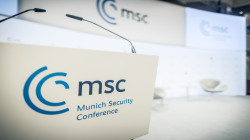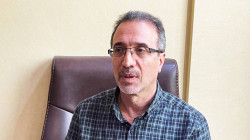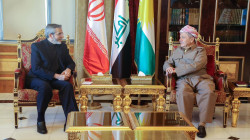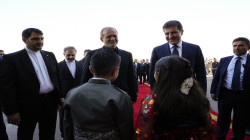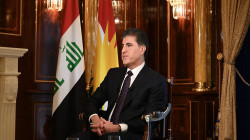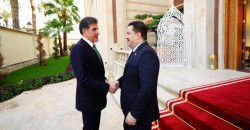Nechirvan Barzani draws a "road map" for the K.D.P., the Kurdistan region, and Iraq
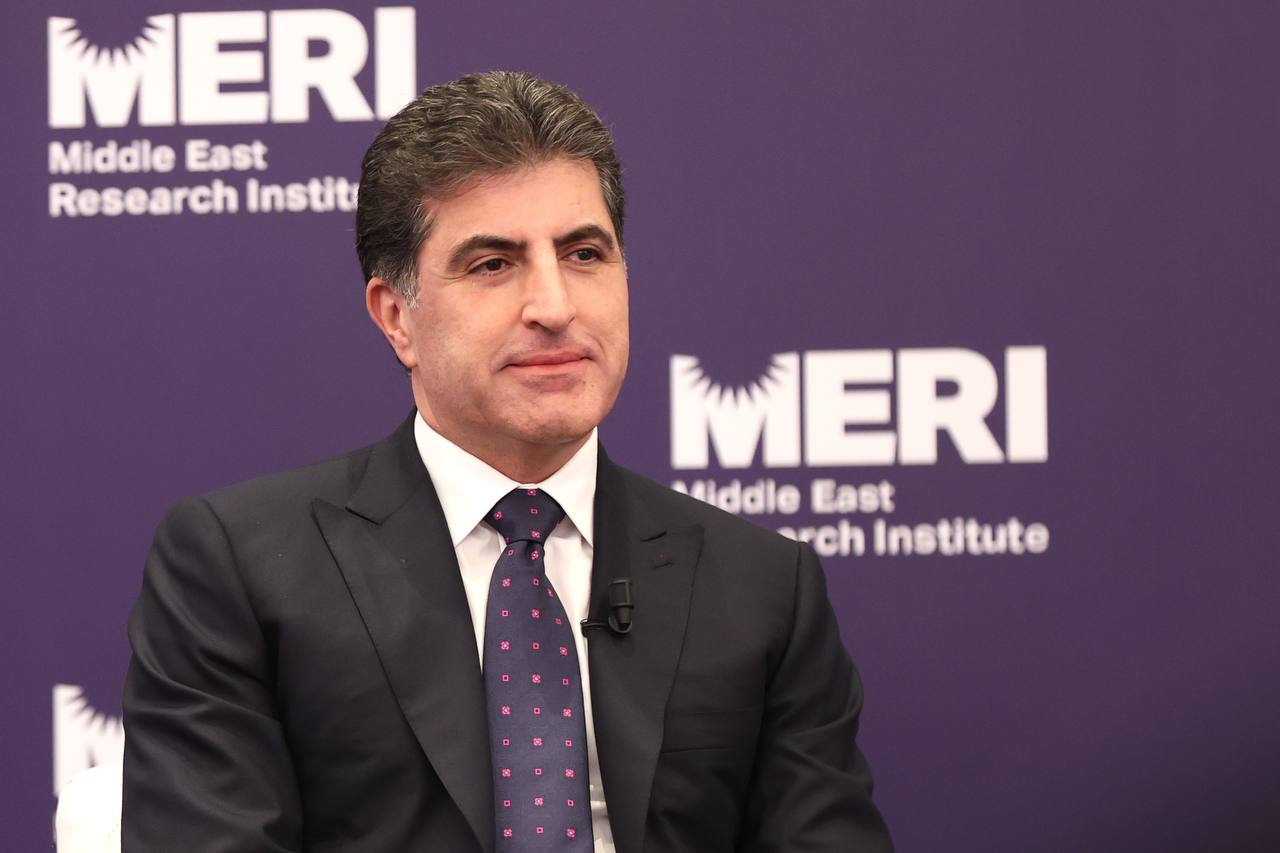
Shafaq News/ In a constantly changing and volatile environment, an observer can barely, if ever, discern the features of a long-term strategy. However, this is not the case with the President of Iraq's region of Kurdistan, Nechirvan Barzani, whose recent statements underlined an "accurate dissection of the political landscape" and serve as a "roadmap" for both Baghdad and Erbil to address their problems and cope with their mutual challenges.
In such dire circumstances, only a "statesman" can draw a rational line between what is conceivable and impossible, speak his adversaries' language, and be a true ally. Perhaps this is what Nechirvan Barzani did both during the last MERI Forum discussion panel in Erbil and his speech at the 14th Conference of the Kurdistan Democratic Party (K.D.P.) in Duhok, where he also named Masrour Barzani as the party's second deputy president; a proposal that was unanimously welcomed.
The statements of Nechirvan Barzani were loaded with a spectrum of annotations that uphold this "roadmap": his remarks on learning from history, his repeated emphasis on the organic relation between the stability of Iraq's region of Kurdistan and Iraq as an entirety, his calls to embrace the Sadrists in the burgeoning political breakthrough, his willingness to join hands with Iraqi Prime Minister Mohammed Shia al-Sudani to address the disputes between Baghdad and Erbil, and his referral to the Patriotic Union of Kurdistan (P.U.K.) as a "key partner" of the K.D.P. despite their profound differences.
Many messages were delivered by Nechirvan Barzani, whether at the MERI forum before a crowd of experts, politicians, and the media, or at the K.D.P. conference, which reaffirmed trust in the party's leader, Masoud Barzani, and in him as vice president. His statements appeared to be future directives or a strategy to upgrade Iraq and Kurdistan's political and social status to the level of developed countries.
It was only by chance that the 14th Conference of the K.D.P. would be held after the political crisis in Iraq had been resolved, allowing the conference, and especially Nechirvan Barzani, to focus on putting forward options in a difficult country, as he described it.
He extended his hand to cooperate and coordinate with Mohammed Shia al-Sudani as he told hundreds of K.D.P. members that the party "has been a great force in the Iraqi political and democratic movement since its establishment, and now we will participate with all Iraqi parties with a new spirit," emphasizing that the conference's success is a victory for Iraq and the Kurdistan Region.
To reaffirm his message, the President of the Region stated that "the new Iraqi government is called upon to create more and better jobs and services in southern and central Iraq, help the private sector, rebuild destroyed Sunni areas, normalize the situation in Kirkuk, Sinjar, and other areas, implement Article 140 of the Constitution, and prevent violations of the Kurdistan Region's rights and powers."
According to Barzani, "in order to resolve the situation in Iraq, no Iraqi component's rights should be violated, and no segment or force of the Iraqi people should be removed. Therefore, the Iraqi government and all Iraqi forces must start new negotiations with the Sadrist Movement," which he described as a "major Iraqi political and mass force," adding that "by transforming Iraq into a state of all components and forces, and by implementing the constitution and the federal system, the stability and sovereignty of Iraq can be preserved."
In his speech, Nechirvan Barzani used the past to serve the present and future, praising the party's leader, Masoud Barzani, and asserting that he represents the party as "a symbol of Kurdish resistance. When President Barzani is in charge, the Kurdish people feel confident that they are defending their national and national rights."
The President of the region then transitioned from the past to the future, stating that "through more work, expanding services, improving the living conditions of the people of Kurdistan, and strengthening the unity of the Kurdistan Region, we will continue to become the party with an absolute majority in Kurdistan."
This vision, however, is not purely political, as it incorporates modern thought to achieve it, such as his emphasis on the role of women and youth both within the party and in society, where he stated that "the freedom of women in Kurdistan makes our country and the Kurdish society stronger and much more productive." He then emphasized the importance of paving the way for the initiatives, ideas, and creativity of the party's youth to be "the new creative force and a source of hope."
Nechirvan Barzani announced the start of a frank dialogue between Kurdistan's parties, especially the P.U.K., to strengthen the region, after describing the K.D.P. as one of the largest and most influential Iraqi political forces, and that he will exert all his efforts to strengthen institutions in the Kurdistan Region and start an open dialogue on improving the administration and political situation of the Kurdistan Region.
He then presented his balancing act for the "Kurdistan people's problem," which he described as one of the Middle East's biggest problems. As he works to strengthen the region, his quest is based on peaceful solutions away from violence.
MERI forum
Nechirvan Barzani elaborated on his vision during his participation in the Middle East Research Institute (MERI) in Erbil on Wednesday evening, as time seemed appropriate for a more in-depth and detailed discussion in the presence of a large number of Iraqi federal officials, Kurdistan Region officials, consuls, representations of foreign countries, university professors, intellectuals, and personalities from within and outside Iraq and the Kurdistan Region.
In a brief message to Baghdad, Barzani stated, "Our concern is for all Iraqis, not just those in the Kurdistan Region. I believe that new conditions have now solidified, and the Kurdistan Region wishes to be diligently supportive of the new Iraqi Prime Minister and his cabinet, because if Iraq becomes stable, so will the Kurdistan Region, and if Iraq's security situation deteriorates, so will the Kurdistan Region's."
"Baghdad cannot be isolated from the region, and the region cannot be isolated from Baghdad," he continued, "What I hope for is that we will be able to learn from the past."
But Barzani is not overly optimistic. He asked, with cautious political content, "Do Iraqis truly believe that their country is for everyone? If we take this as an entry point, the answer is simple: no."
He then urged Erbil and Baghdad to learn from their mistakes in the past and work together. However, he was also quick to point out that he is talking not just about the Kurds but the entire region.
The President wondered about the nature of Baghdad's current political system, whether it is central or federal. It is federal, according to the constitution, but the country is administered with a very centralized mentality.
Barzani also noted that his words are not meant to "point to what has been accomplished and what has not been accomplished, but rather to urge a new beginning for both sides."
Concerning al-Sudani's government, Barzani asserted confidently that he "deserves support and deserves to be given the opportunity to be able to find solutions to some of the problems that exist in Iraq."
"This is possible if we all follow the Iraqi constitution and help one another. The logic of the strong and the weak cannot be adopted to solve this country's problems. As Iraqis, we must create a formula for peaceful coexistence in Iraq that benefits all Iraqis."
In a sign of his understanding of the current situation's sensitivity, Barzani stated that after all these years, Iraqis compare their conditions to those of the surrounding countries, as they deserve a much better life, especially since Iraq is rich and has great potential, and can be a beacon for the entire region.
"The demonstrations that we have seen in Iraq, in general, have had very legitimate demands: a better country, job opportunities, and for young people to be able to secure a better life for themselves. I believe that Iraqis deserve that," the region's President continued.
Most Iraqis may agree with what Barzani later said, reflecting on his years of political experience and observations, when he pointed out that "Democracy is a culture, not a gift bestowed upon a country. If we compare Iraq from 2003-2004 to now, we will find out that we have made significant progress, but have not yet reached the stage that you mentioned and said exists in Britain, for example."
In an implicit endorsement of al-Sudani's government, Barzani stated, "If we compare the current and former prime ministers, we find that the former PM had little support from other parties, but if the current PM made any decision tomorrow, the other parties, especially the Shiites, would not be able to say that no one supported this prime minister. He has the support of all Shiite parties, the Kurds, and the Sunnis, and our expectations for solving Iraq's problems from this PM are different from those we expected from others."
In response to a question about the region and the federal government's challenges, Barzani stated, "the fundamental question is: Does Baghdad want a politically and economically stable Iraq?" He then elaborated on his point, noting, "The first condition for stability is resolving Baghdad's issues with the Kurdistan Region. This is a requirement for anyone who governs Baghdad. The Kurdistan Region, in return, truly seeks to address these problems and knows it is better to support Baghdad."
Barzani laments Baghdad's approach to the oil issue. "They always tie the entire issue to Iraq's sovereignty. But, of course, we do not intend to violate it; our perspective about the oil and gas file differs significantly from Baghdad's. We consider oil as a commercial commodity that should be used to benefit Iraqi citizens and, as a result, provide services to the entire Iraqi population."
He also addressed another sensitive issue, "Even though the Kurdistan Region possesses oil, it is not independent. It may be able to deliver prosperity to Kurdistan's population, but it will not be a reason for independence because the Kurdistan Region's terrain is complex. As a result, Baghdad's view and concept of the Kurdistan Region, a key partner, must alter, and this must be recognized."
Barzani was anxious to state unequivocally that he "does not blame Baghdad entirely", to avoid being misunderstood. Both sides must learn from their mistakes in the past, and I believe we have an opportunity to do so now. I do not want to imply that Baghdad is solely to blame, and I see no reason to engage in this dispute. We have a constitution that stipulates that these are our duties and rights, and we want to perform our duties while also demanding our rights, no more, no less."
On the erosion of Kurdistan's influence in Baghdad, Barzani stated, "This schism in Kurdistan has not only harmed Kurds, but has had far-reaching consequences in all aspects. We would undoubtedly be stronger if we were together in Baghdad. What matters this time is the agreement we reached with the Coordination Framework. Especially since we - the two biggest parties in Kurdistan - signed it together, and while we had some tactical disagreements, we were in agreement and signed it jointly because we were demanding our rights together."
Barzani places a high value on Kurdistan's stability, and he is candid about the disagreements with the P.U.K., "I do not believe that having a green and a yellow area is appropriate; there should only be Kurdistan. I am highly opposed to using that terminology, as it simply weakens Kurdistan's position." To reiterate his position, he stated that, despite the existence of problems between the two parties, the P.U.K. will continue to be the K.D.P.'s main partner, calling for more effort to solve problems, admit mistakes, and reach a common understanding, emphasizing that the two parties complement each other.
Barzani and al-Sadr
Nechirvan Barzani revealed part of what happened during Iraq's recent political impasse, as well as his role and communication with the Sadrist leader, "We have great regard for Muqtada al-Sadr and believe that the Sadrist movement's engagement in the Iraqi political process is essential. During our meeting in Najaf, I told al-Sadr that he could strengthen and correct Iraq's political reform. We continue to feel that the Sadrist Movement and its participation in the political process are vital. I believe the current government should make efforts to convince the Sadrist Movement to support and participate in the government."
Oil and Turkey
On the judicial file between Ankara and Baghdad over oil, Barzani stressed the need to be cautious and reasonable, recalling what Turkey did: "It was an aid to the Kurdistan Region by allowing us to extend an oil tanker pipeline from the Kurdistan Region to the port of Ceyhan, and we believe that this was an aid to Iraq and the Kurdistan Region together. We also believe that going with this issue to an international court will not solve any problem between the two countries."
"We are neighbors, and Iraq is an important partner for Turkey. Therefore, I urge Baghdad and the current prime minister to address this matter realistically. This issue must be settled amicably and through dialogue between Turkey and Iraq," he said, adding that "we in the Kurdistan Region are willing to play a vital role in this regard."
The President of the region concluded his speech, most importantly the accumulation of his political experience and contact with people's issues, by issuing an invitation accompanied by an implicit warning, that the parties in Iraq must have received a clear message from the people. The message of those demonstrations that took place everywhere in Iraq was the same: Enough is enough, and we no longer accept you! We will never accept your promises and pledges till this scenario changes!"
"We must learn from our mistakes, and I hope that Iraq's political forces will learn from theirs and recognize the people's obvious message and demands for a better life. I believe that the new prime minister deserves to be given a chance and the support of all Kurdish, Sunni, and Shiite political forces to succeed in the task entrusted to him."
